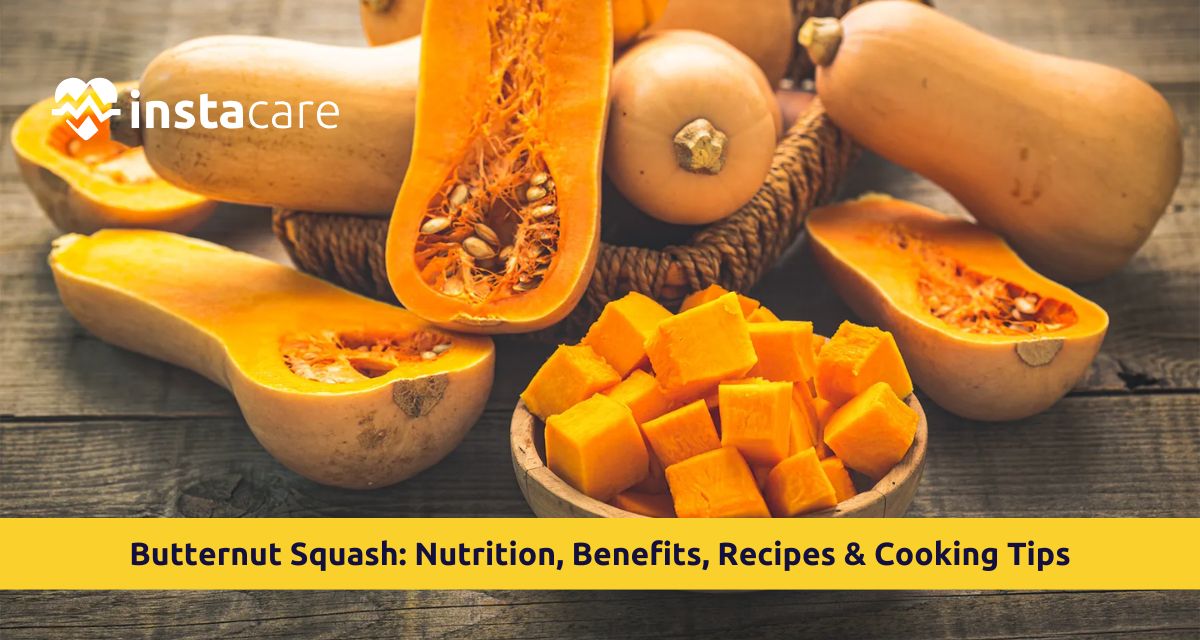What is Butternut Squash?
Nutrition Profile of Butternut Squash
- Butternut squash calories: 82 calories alone
- Carbs: 22 grams
- Fiber: 7 grams
- Protein: 2 grams
- Fat: Less than 1 gram
Butternut squash vitamins and minerals include:
- Vitamin A: Over 400% of your daily value
- Vitamin C: 50% daily value
- Potassium: Heart-healthy
- Magnesium: Makes muscles function
- Folate: Helps cells grow
Health Benefits of Butternut Squash
Protects Eye Health
Aids Immune Function
Facilitates Weight Loss
Benefits Heart Health
Digestion Helper
Reduces Inflammation
How to Select and Store Butternut Squash?
Choosing the Right Squash:
- Squash needs to be heavy for weight
- The skin should not be soft and should not be tan in color
- Don't pick cut squash or brown spot-scarred squash
- When knocked upon, the mature squash will have a hollow sound
Butternut Squash Storage Tips:
- Whole squash can be kept 2-3 months in a dry, cool location
- Whole squash refrigeration is not desired
- Chill sliced portions in plastic wrap for up to 5 days
- Frozen cooked squash will keep for 8 months
Read More: Turnips: Health Benefits, Nutrition Facts, and More
Cooking Tips for Butternut Squash
Cutting Tips
- Employ heavy sharp knife
- Cut ends off either end first
- Peel with vegetable peeler
- Split lengthwise and remove seeds
- Chop up into cubes or slices as desired
Easy Cooking Ways
- Cut into cubes
- Drizzle with olive oil and salt
- Roast 400°F 25-30 minutes
- Steaming: Steam cubed squash 15-20 minutes until tender
- Microwaving: Pierce whole squash and cook in microwave 10-15 minutes
- Stand, then cut and seed
- Boiling: Boil diced squash 10-15 minutes
Delicious Butternut Squash Recipes
Ingredients:
- 3 lbs butternut squash, peeled and diced
- 1 onion, diced
- 3 cups vegetable broth
- Salt and pepper, to taste
Instructions:
- Roast squash pieces in 400°F oven 30 minutes
- Sauté onion until tender
- Blend roasted squash, onion, and broth until pureed
- Heat and serve to taste
Easy Roasted Butternut Squash
- Cut squash into 1-inch cubes
- Toss with olive oil, pepper, and salt
- Roast at 425°F for 25 minutes
- Delicious side dish
Butternut Squash Puree
- Steam cubed squash until extremely tender
- Blend with a small amount of water until smooth
- Don't need to season butternut squash baby food
Butternut Squash Curry
- Sauté the garlic and onions
- Add sliced squash and curry powder
- Add coconut milk
- Simmer until butternut squash is tender
Butternut Squash in Special Diets
- For Weight Loss: Low-calorie comfort food, and excellent for weight control.
- Diabetes-Friendly: Natural sugars, but fiber regulates blood sugars.
- Gluten-Free: Gluten-free naturally and can replace wheat in most recipes.
- Vegan and Vegetarian: Nutrient-dense for addition to vegan and vegetarian dishes.
- Keto Diet: With added carbohydrates, use sparingly if on keto.
Butternut Squash vs Pumpkin
- Butternut squash less watered down, sweeter
- Pumpkin richer, more earthy taste
- Both not necessarily all that different nutritionally
- Butternut a little less difficult to chop and serve
- Pumpkin should be reserved for traditional fall displays
Side Effects and Precautions
- Nausea if consuming enormous quantities
- Staining of hands' skin, turning orange, due to overindulgence (harmless)
- Allergic reaction (rare, rarely happens)
Conclusion

